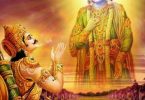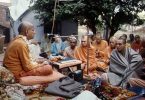Question: In Bhagavad-Gita 2.47, Lord Krishna says, “You have the right to perform your prescribed duty, but you are not entitled to the fruits of action. Never consider yourself the cause of the results of your activities, and never be attached to not doing your duty.”
Question a) In this world activities are performed with the results in mind and in fact the results are the motivation for one to do work. How does one perform his activities in this world without expectation of fruits / results?
Answer by Romapada Swami:
a) Krishna is not saying here that the results should be ignored or that the duties be carelessly performed without concern for the results. What He is saying is simply that we are not entitled to be the enjoyer of the fruits of our duties or activity. They are meant to be dedicated to Him. We have the right to do our duty – very nicely and conscientiously – not so we can enjoy the results but for Krishna to enjoy. If you are cultivating a garden, for example, you should make every effort to get the best yield; however, the actual yield of that garden is up to Krishna. Whatever is produced, offer those fruits to Krishna.
Krishna is the actual beneficiary or enjoyer of the results. This is only natural, because Krishna is the actual proprietor of everything, including the strength and intelligence with which we perform our work. Motivation for work in this case comes not from the expectation of how the results will benefit oneself, but from the expectation of pleasing Krishna, which is far more satisfying, and hence far more motivating than any meager material achievements.
Question b) Apparently we are doing the activity. So how do we reconcile that “I am not the cause of my activities”?
Answer by Romapada Swami: b) In Bg 18.14, Krishna explains that there are five factors of action, only one of which is our self, the others being the senses and instruments, the field of action, the different endeavors and ultimately the Supersoul. As said above, everything required for performing an activity, including our own intelligence and strength comes from Krishna. Our independent will constitutes one of the factors, but we are miniscule and dependent on the Lord for every movement and can act only under His sanction. Thus, with a little introspection, we can understand that we are not the cause or doer. We may be an immediate or intermediate cause, but the ultimate doer is Krishna.
See also BG 5.14 (“The embodied spirit, master of the city of his body, does not create activities, nor does he induce people to act, nor does he create the fruits of action. All this is enacted by the modes of material nature.”) Material nature is creating the fruits of all material activities, not the soul. We have the capacity to perform work, we make various endeavors, material nature creates results…and material nature works under Krishna’s direction (BG 9.10).
Question c) Does this mean that because of one’s past karma one gets results, and not by just one’s own efforts only?
Answer by Romapada Swami: c) Certainly past karma influences the results we get now. From observing around us and from our own experience, we can see that people don’t always get results in exact proportion to their endeavors. This does not render our present efforts useless; they make up our future karma! (Please refer to our previous discussions on karma and freewill. Digests 00004A, 00070B)
Question d) What is the significance of one’s free will and efforts?
Answer by Romapada Swami d) As Krishna has unlimited freewill, so we have minute freewill, by which we can choose and desire to enjoy in so many ways in this world, and make efforts to attain them. Alternately, by our freewill we can choose to act in relationship with Krishna and offer our efforts in His service. By doing our prescribed duties without attachment to the results, as advised by Krishna, we are still exercising our freewill, but in subordination to or in harmony with the Supreme Will.
Srila Prabhupada often gave the simple example of the finger in relation to the body. If a finger decides to feed itself instead of doing its prescribed function of bringing the food to the mouth, and detaches itself from the body, then despite working hard, its efforts will bring no benefit to the finger. Similar will be our efforts for obtaining our individual interests in this world apart from Krishna. Such efforts may bring some temporary enjoyment but ultimately leaves the soul suffering the miseries of material existence.
[For additional details to discussions on this topic, please refer to the Digest of Answers available on the web page.]







